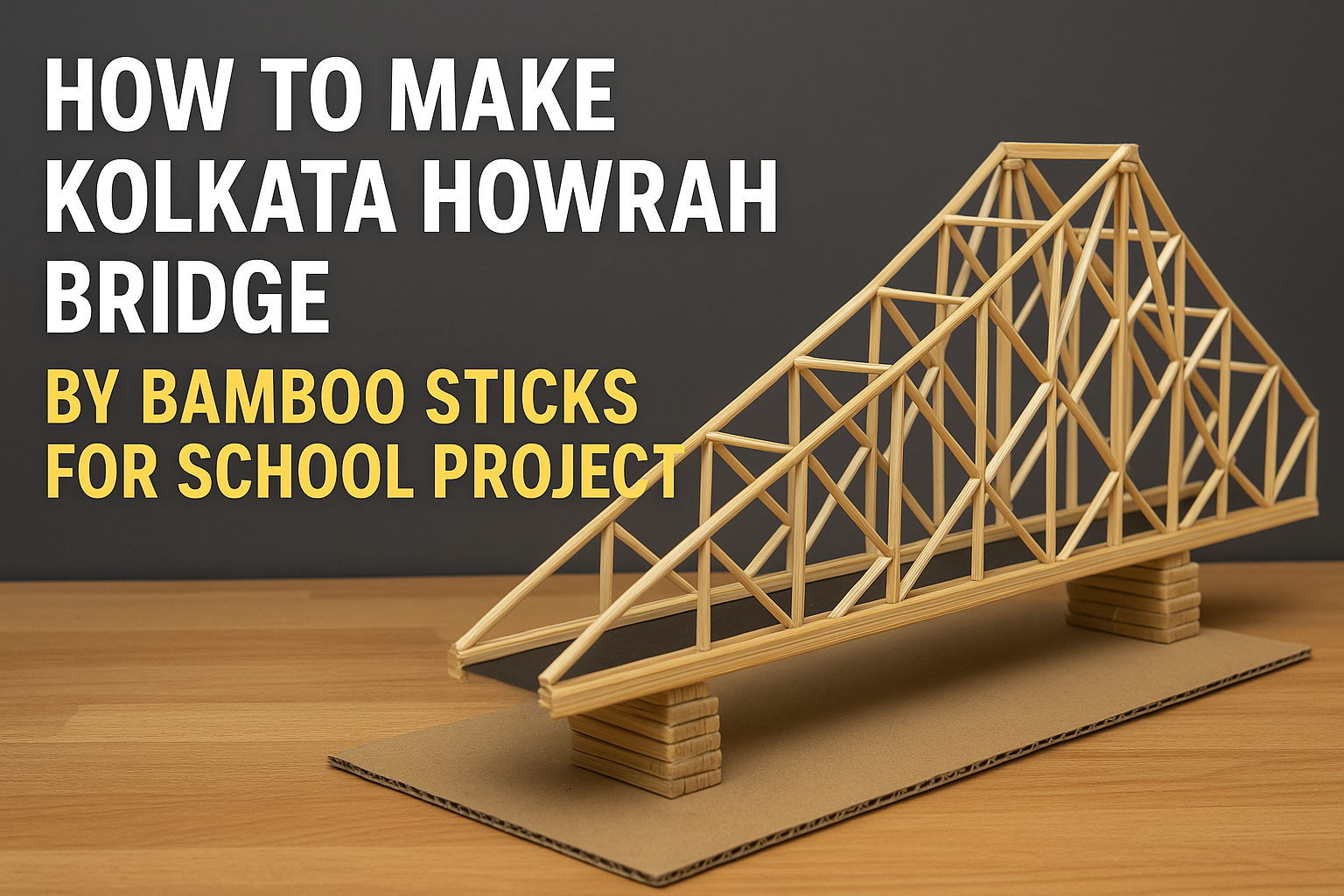Introduction
Ever wondered how to make the iconic Howrah Bridge of Kolkata come alive on your school desk? If you’re working on a creative school project, building a miniature model of the Howrah Bridge using bamboo sticks is not only fun but a fantastic learning experience. Let’s walk through everything step-by-step to help you nail this project like a pro!

Significance of the Howrah Bridge
The Howrah Bridge is one of India’s most recognized landmarks, connecting Kolkata with Howrah over the Hooghly River. It’s a steel marvel known for its unique cantilever structure, and making a miniature model of it helps students understand the basics of bridge engineering.
Why Choose Bamboo Sticks for the Model?
Bamboo sticks are lightweight, eco-friendly, affordable, and super easy to work with. Plus, they resemble the steel girders of the actual bridge quite well when arranged neatly!
Materials Required
Essential Supplies
- Bamboo sticks or ice cream sticks
- Strong adhesive (Fevicol or hot glue)
- Cardboard (for base)
- Ruler and pencil
- Scissors or wire cutter
- Black/grey paint and paintbrush
Optional Tools for Extra Detailing
- Cutter knife
- String or thread (to mimic cables)
- Toothpicks (for finer details)
- Mini LED lights (for night effect)
Step-by-Step Guide to Making the Howrah Bridge Model
Research and Reference Images
Start with looking at clear photos or diagrams of the Howrah Bridge. Observe its cantilever design, the symmetry, and the railings and road in the middle.
Designing the Base Structure
Building the base platform
Use a piece of cardboard or thermocol sheet as the foundation. This gives your model a sturdy platform to stand on.
Marking the bridge outline
Draw a straight line across the base and sketch where the main pillars and supports will go.
Building the Main Bridge Frame
Creating the pillars
Cut bamboo sticks of equal length and glue them vertically on both sides of your base. These will act as support pillars.
Joining the horizontal beams
Connect the vertical sticks with horizontal bamboo pieces to make the base frame. Ensure it’s symmetrical on both sides.
Creating the Cantilever Arms
Cutting and shaping the arms
Measure and cut sticks to build the angled arms that extend toward the center from both sides. These are key to the cantilever design.
Attaching with glue and support
Use glue generously and hold each piece for a few seconds to ensure a solid fix. Support pieces underneath until it dries.
Detailing and Finishing Touches
Adding railings, roads, and minor details
Use thin sticks or threads to make railings. You can glue a thin strip of black paper or paint a black path to simulate the road.
Painting and presentation tips
Paint the bamboo sticks in grey or silver to mimic steel. You can also create small vehicles with clay or paper for added realism!
Safety Tips While Working on the Project
Handling Tools Safely
Always use scissors and cutters with adult supervision. Don’t rush—precision is more important than speed.
Working with Glue and Sharp Objects
Hot glue guns can cause burns, and knives are sharp—so be cautious. Use a mat or thick paper underneath while cutting.
Benefits of Making a Bridge Model for Students
Boosts Creativity and Engineering Thinking
Creating a structural model helps you understand how real-world bridges are built and balanced. It’s a fun intro to basic engineering concepts.
Encourages Patience and Focus
Model-making teaches you patience, attention to detail, and planning. It’s a hands-on way to learn and explore.
Conclusion
Making a Kolkata Howrah Bridge model with bamboo sticks is more than a school project—it’s an opportunity to blend creativity, education, and craftsmanship. With the right materials and a bit of patience, you’ll have a miniature masterpiece to be proud of. Just remember: accuracy and neatness go a long way. So grab those sticks, get crafty, and let your bridge-building journey begin.
Thank you very much visiting my website get more contenthttp://Click Here
